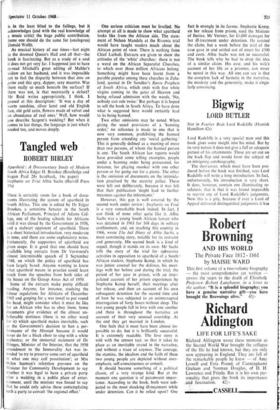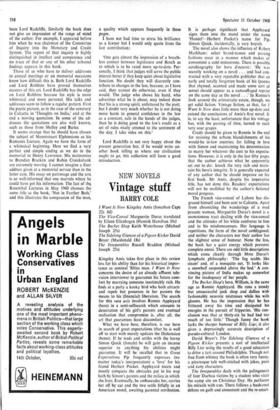Bigwig
LORD BUTLER
Lord Radcliffe is a very special man and this book gives some insight into his mind. But by its very nature it does not give a full or adequate picture of his attainments. These are set out on the back flap and would form the subject of an intriguing autobiography.
The dust-cover, which must have been pro- duced before the book was finished, says Lord Radcliffe will write a long introduction. In fact, unfortunately, his introduction is very short. It does, however, contain one illuminating re- velation; that is that it was found impossible to reprint any of Lord Radcliffe's judgments. Now this is a pity, because if ever a Lord of Appeal delivered distinguished judgments it has
been Lord Radcliffe. Similarly the book does not give an impression of the range of mind of the author. For example, I appeared before him when he was chairman of the Committee of Inquiry into the Monetary and Credit System. The report of that inquiry is highly distinguished in intellect and competence and no trace of that or any of his other tribunal findings appears in this book.
Those of us who have to deliver addresses to annual meetings or on memorial occasions know how difficult this is. Both Lord Radcliffe and Lord Robbins have proved themselves masters of this art. Lord Radcliffe has the edge on Lord Robbins because his style is more whimsical and more personal. His talks and addresses seem to follow a regular pattern. First the poetic picture, as in the case of the cemetery in Calcutta in 'Thoughts on India,' and at the end a moving quotation. In some of the ad- dresses the quotations are alas well known, such as those from Shelley and Burke.
It seems strange that he should have chosen the subject of Mountstuart Elphinstone as his Romanes Lecture. Again we have the form of a whimsical beginning. Here we find a very perfect and simple ending as we do in the memorial to Henry Lawrence. His testimonies to Brendan Bracken and Robin Cruickshank are extremely moving. I cannot imagine a finer address given at a memorial service than in the latter case. His essay on patronage and the arts is so well-informed that one marvels where he could have got his information. The last of the Rosenthal Lectures in May 1960 chooses the same title as the book, 'Not in Feather Beds,' and this illustrates the compassion of the man, a quality which appears frequently in these Pages.
I have not had time to stress his brilliance as a lawyer but I would only quote from the last contribution: 'One gets almost the impression of a breath- less contest between legislature and Bench as to which is to be rated more up-to-date. Per- sonally, I think that judges will serve the public interest better if they keep quiet about legislative function. No doubt they will discreetly con- tribute to changes in the law, because, as I have said, they cannot do otherwise, even if they would. The judge who shows his hand, who advertises what he is about, may indeed show that his is a strong spirit, unfettered by the past; but I doubt very much whether he is not doing more harm to general confidence in the law as a constant, safe in the hands of the judges, than he is doing good to the law's credit as a set of rules nicely attuned to the sentiment of the day. I take sides on this.'
Lord Radcliffe is not very happy about the present generation but, if he would write an- other book telling us where our civilisation ought to go, this collection will form a good introduction.







































 Previous page
Previous page